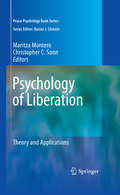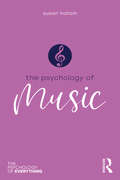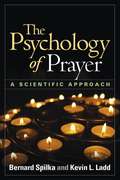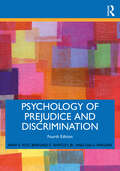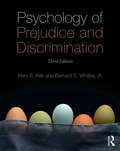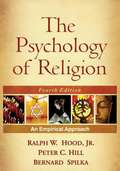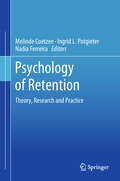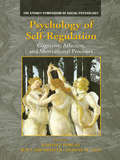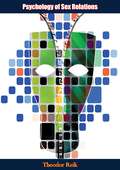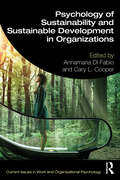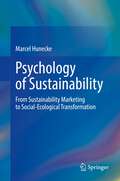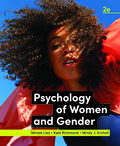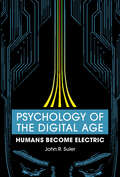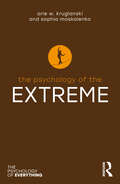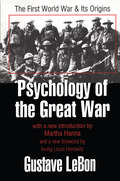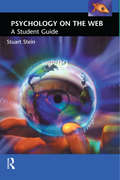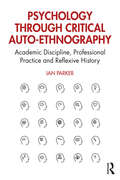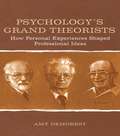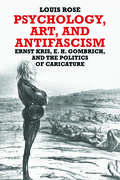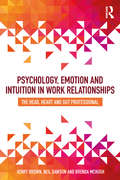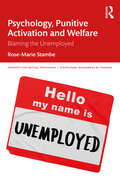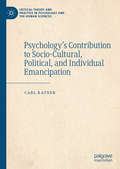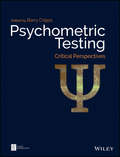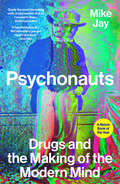- Table View
- List View
Psychology of Liberation
by Maritza Montero Christopher C. SonnSince the mid-1980s, the psychology of liberation movement has been a catalyst for collective and individual change in communities throughout Latin America, and beyond; and recent political developments are making its powerful, transformative ideas more relevant than ever before. Psychology of Liberation: Theory and Applications updates the activist frameworks developed by Ignacio Martin-Baro and Paulo Freire with compelling stories from the frontlines of conflict in the developing and developed worlds, as social science and psychological practice are allied with struggles for peace, justice, and equality. In these chapters, liberation is presented as both an ongoing process and a core dimension of wellbeing, entailing the reconstruction of social identity and the transformation of all parties involved, both oppressed and oppressors. It also expands the social consciousness of professionals, bringing more profound meaning to practice and enhancing related areas such as peace psychology, as shown in articles such as these: Philippines: the role of liberation movements in the transition to democracy. Venezuela: liberation psychology as a therapeutic intervention with street youth. South Africa: the movement for representational knowledge. Muslim world: religion, the state, and the gendering of human rights. Ireland: linking personal and political development. Australia: addressing issues of racism, identity, and immigration. Colombia: building cultures of peace from the devastation of war. Psychology of Liberation demonstrates the commitment to overcome social injustices and oppression. The book is a critical resource for social and community psychologists as well as policy analysts. It can also be used as a text for graduate courses in psychology, sociology, social work and community studies.
Psychology of Music (The Psychology of Everything)
by Susan HallamHow does music affect our moods? What is the best way to develop musical skills? How does the definition of music vary between cultures? The Psychology of Music explores the important impact music has on our everyday lives, and its influence on society, groups and individual people. It demonstrates how music can benefit our intellectual functioning, and health and well-being, and examines musical ability as both a gift and something that can be developed through learning and practice. Music can enhance our understanding of humanity and modern life and The Psychology of Music shows us the significance of music, and the power it can have over our behaviour.
Psychology of Prayer
by Kevin L. Ladd Bernard SpilkaReviewing the growing body of scientific research on prayer, this book describes what is known about the behavioral, cognitive, emotional, developmental, and health aspects of this important religious activity. The highly regarded authors provide a balanced perspective on what prayer means to the individual, how and when it is practiced, and the impact it has in people's lives. Clinically relevant topics include connections among prayer, coping, and adjustment, as well as controversial questions of whether prayer (for oneself or another) can be beneficial to health. The strengths and limitations of available empirical studies are critically evaluated, and promising future research directions are identified.
Psychology of Prejudice and Discrimination
by Lisa S. Wagner Mary E. Kite Bernard E. Whitley, Jr.Psychology of Prejudice and Discrimination provides a comprehensive and compelling overview of what psychological theory and research have to say about the nature, causes, and reduction of prejudice and discrimination. It balances a detailed discussion of theories and selected research with applied examples that ensure the material is relevant to students. This edition has been thoroughly revised and updated and addresses several interlocking themes. It first looks at the nature of prejudice and discrimination, followed by a discussion of research methods. Next come the psychological underpinnings of prejudice: the nature of stereotypes, the conditions under which stereotypes influence responses to other people, contemporary theories of prejudice, and how individuals’ values and belief systems are related to prejudice. Explored next are the development of prejudice in children and the social context of prejudice. The theme of discrimination is developed via discussions of the nature of discrimination, the experience of discrimination, and specific forms of discrimination, including gender, gender identity, sexual orientation, age, ability, and appearance. The concluding theme is the reduction of prejudice. The book is accompanied by a comprehensive website featuring an Instructor Manual that contains activities and tools to help with teaching a prejudice and discrimination course; PowerPoint slides for every chapter; and a Test Bank with short answer and multiple-choice exam questions for every chapter. This book is an essential companion for all students of prejudice and discrimination, including those in psychology, education, social work, business, communication studies, ethnic studies, and other disciplines. In addition to courses on prejudice and discrimination, this book will also appeal to those studying racism and diversity.
Psychology of Prejudice and Discrimination: 3rd Edition
by Bernard E. Whitley Jr. Mary E. KiteThe Psychology of Prejudice and Discrimination provides a comprehensive and compelling overview of what psychological theory and research have to say about the nature, causes, and reduction of prejudice and discrimination. It balances a detailed discussion of theories and selected research with applied examples that ensure the material is relevant to students. Newly revised and updated, this edition addresses several interlocking themes, such as research methods, the development of prejudice in children, the relationship between prejudice and discrimination, and discrimination in the workplace, which are developed in greater detail than in other textbooks. The first theme introduced is the nature of prejudice and discrimination, which is followed by a discussion of research methods. Next comes the psychological underpinnings of prejudice: the nature of stereotypes, the conditions under which stereotypes influence responses to other people, contemporary theories of prejudice, and how values and belief systems are related to prejudice. Explored next are the development of prejudice in children and the social context of prejudice. The theme of discrimination is developed via discussions of the nature of discrimination, the experience of discrimination, and specific forms of discrimination, including gender, sexual orientation, age, ability, and appearance. The concluding theme is the reduction of prejudice. An ideal core text for junior and senior college students who have had a course in introductory psychology, it is written in a style that is accessible to students in other fields including education, social work, business, communication studies, ethnic studies, and other disciplines. In addition to courses on prejudice and discrimination, this book is also adapted for courses that cover topics in racism and diversity. For additional resources, consult the website BreakingPrejudice.org, which focuses on pedagogical materials that can be used to address both cultural awareness and self-awareness of prejudice and to increase students' multicultural competence. Specifically, the site includes: Original teaching activities (ready to use with minimal preparation, including discussion questions) An annotated list of podcasts (categorized by topic) An annotated list of videos (categorized by topic) A set of social justice songs (categorized by topic) Four original public service announcements 16 video diaries about people's personal experience with prejudice Interviews with 13 social justice activists
Psychology of Religion, Fourth Edition
by Ralph Hood Jr. Peter HillScholarly and comprehensive yet accessible, this state-of-the-science work is widely regarded as the definitive psychology of religion text. The authors synthesize classic and contemporary empirical research on numerous different religious groups. Coverage includes religious thought, belief, and behavior across the lifespan; links between religion and biology; the forms and meaning of religious experience; the social psychology of religious organizations; and connections to morality, coping, mental health, and psychopathology. Designed for optimal use in advanced undergraduate- and graduate-level courses, every chapter features thought-provoking quotations and examples that bring key concepts to life. New to This Edition Revised and updated with the latest theories, methods, and empirical findings. Many new research examples. Restructured with fewer chapters for better 'fit' with a typical semester. More attention to the differences between religion and spirituality Covers emerging topics genetics and neurobiology, positive psychology, atheism, and more.
Psychology of Retention: Theory, Research And Practice
by Melinde Coetzee Ingrid L. Potgieter Nadia FerreiraThis book offers a contemporary review of talent retention from the viewpoint of human resource management and industrial/organisational psychology. With a practical and relevant perspective it enriches critical knowledge and insight in the psychology of talent retention. It offers interpretation of difficult factors facing organisations such as the conceptualisation of talent, the forecasting of talent demand and supply, external and internal factors that influence talent attraction, development and retention, the alignment between talent management and business strategy. Also covered is the implementation of human resource practices and strategies in response to the needs of different organisational contexts and workforce characteristics. The chapter contributions will not only enrich knowledge and insight in the complex phenomenon of talent retention, but also advance new original ways of thinking and researching this critically important area of inquiry. The book is intended for graduate students and researchers as an overview of the topic of talent retention, practitioners will also find it informative.
Psychology of Self-Regulation: Cognitive, Affective, and Motivational Processes (Sydney Symposium of Social Psychology)
by Roy F. Baumeister Joseph P. Forgas Dianne M. TiceThe ability to regulate and control our behaviors is a key accomplishment of the human species, yet the psychological mechanisms involved in self-regulation remain incompletely understood. This book presents contributions from leading international researchers who survey the most recent developments in this fascinating area. The chapters shed new light on the subtle and often subconscious ways that the people seek to regulate their thoughts, feelings and behaviors in everyday social life. The contributions seek answers to such intriguing questions as: How can we improve our ability to control our actions? How do people make decisions about which goals to pursue? How do we maintain and manage goal-oriented behavior? What happens when we run out of self-regulation resources? Can we match people and the regulatory demands of to specific tasks so as to optimize performance? What role does self-regulation play in sports performance, in maintaining successful relationships, and in managing work situations? The book offers a highly integrated and representative coverage of this important field, and is suitable as a core textbook in advanced courses dealing with social behavior and the applications of psychology to real-life problems.
Psychology of Sex Relations
by Theodor ReikWitty and fascinating look at Love and the Sex-Drive from world-renowned expert psychoanalysist Theodor Reik.“This book was first published in 1943 and will have been read long ago by all senior psychoanalysts and most students of psychopathology…Even the most obdurate opponents of psychodynamic theory must be disarmed by the high quality of the writing and lost in admiration for the erudition of the author, whose copious quotations, allusions and aphorisms are nearly always apt and frequently both witty and illuminating. They cover a wide field of learning in several languages and range from philosophy and psychology to Lewis Carroll, Punch and the popular press. Too often the ponderous jargon and turgid style of psychoanalytical papers bring back at least one reader to the schoolroom, where he is trying ineffectively to construe the more involved passages of Livy or Thucydides. It is, therefore, refreshing to find a serious work from a psychoanalyst written in clear and impeccable English and leavened on every page with natural sincerity and effortless humour.The main objective of the book is to demonstrate that love, affection and tenderness are not the product of aim-inhibited sex and to controvert the Freudian doctrine that all forms of love are exclusively of sexual origin. Although the author remains a warm and generous admirer of his original teacher, Freud, and of his genius and achievements, he demolishes his libido theory with criticisms, barbed with ironic wit. "His libido system, however, will, I am afraid, have the sad destiny which Herbert Spencer once bemoaned in speaking of 'a beautiful theory that was murdered by a gang of brutal facts"'-British Journal of Psychiatry.
Psychology of Sustainability and Sustainable Development in Organizations
by Cary L. Cooper Annamaria Di FabioThis volume answers calls for improving sustainability and sustainable development in organizations from a psychological point of view. It offers a range of perspectives on the current research in the psychology of sustainability and sustainable development to highlight effective ways of improving well-being and healthy sustainable development in organizations. Section 1 introduces the concept of the psychology of sustainability and sustainable development as well as macro topics of related issues in organizations. Section 2 focuses on themes traditionally recognized in organizational psychology literature, such as performance, negotiation, leadership, resistance to change, innovation, and digital transformation. Section 3 presents variables to enhance sustainability and sustainable development in organizations and considers levels of prevention. Topics include humor awareness as a primary prevention resource in organizations, intrapreneurial self-capital as an individual preventative strength, compassion within organizations, perfectionism as an inhibitor in organizational contexts, and job crafting from individual to collaborative to organizational, meaningfulness and sustainable careers. With a clear psychological focus on the topic of leading sustainability efforts, this book will be of great interest to students and academics who want to learn more about corporate sustainability. It is also a useful resource for business executives, team leaders and managers.
Psychology of Sustainability: From Sustainability Marketing to Social-Ecological Transformation
by Marcel HuneckeThis book analyzes key findings and developments of psychology for sustainable development. The starting point is a discussion of the established literature of environmental psychology in regards to which factors influence environment-related behavior. Afterwards, the author discusses strategies and interventions that can promote sustainable behavior. It is very important that in order to increase the effectiveness of environmental psychological interventions, these must be first contextualized socially. Furthermore, interventions that aim to bring about a socio-ecological transformation should also focus on the goal of subjective well-being. Overall, the findings of environmental psychology are brought together with theories from positive psychology and the approach of psychological resources from positive psychology and the approach of psychological resources from health psychology to answer the question: How can the socio-ecological transformation of a consumer society be supported by an inner transformation of human beings. An answer to this question is provided by the promotion of six psychological resources for sustainable lifestyles: mindfulness, capacity for pleasure, self-acceptance, self-efficacy, construction of meaning and solidarity can both promote individual well-being and increase motivation for sustainable behavior.
Psychology of Women and Gender (Second Edition)
by Miriam Liss Kate Richmond Mindy J. ErchullGround-breaking, inclusive, and modern for a new generation of students Providing a lens for interpreting the ever-changing issues that influence girls, women, and trans and/or gender nonbinary individuals today, Psychology of Women and Gender 2e incorporates an intersectional lens throughout the text. It expands the idea of gender by challenging assumptions of a gender binary and includes additional focus on the experiences of men. The new edition is grounded in both feminist theory and psychological research. A new research methods chapter teaches students to use research and critical thinking to strengthen their own voices. Student learning becomes active with a new and engaging Norton Illumine Ebook that engages students with active learning opportunities, including embedded videos that make the content come alive through the voices of diverse individuals, and Check Your Understanding questions that provide retrieval practice so students “lock in” what they learn in every section.
Psychology of the Digital Age
by John SulerBased on two decades of participant-observation field research in diverse online environments, this engaging book offers insights for improving lifestyles and enhancing wellbeing in the digital age. John R. Suler, a founder of the field of cyberpsychology, explains its fundamental principles across a wide variety of topics, including online identity management, disinhibition, communication via text and photographs, intimacy and misunderstandings in online relationships, conflicting attitudes toward social media, addiction, deviant behavior, virtual reality, artificial intelligence, and media overload. He provides a new framework, the 'Eight Dimensions of Cyberpsychology Architecture', which researchers, students, and general readers interested in cyberpsychology can apply as a valuable tool for creating and understanding different digital realms. Psychology of the Digital Age focuses on the individual, shedding new light on our conscious as well as subconscious reactions to online experiences and our intrinsic human need to self-actualize.
Psychology of the Extreme (The Psychology of Everything)
by Arie W. Kruglanski Sophia MoskalenkoWhat does extremism mean? How does it show up in our daily lives? What drives people to extreme behaviors, and how can we learn to live and thrive in the age of overdrive?The Psychology of the Extreme provides an accessible introduction to extremism as a force that can affect all aspects of culture and people’s choices in everyday settings. It explores the underlying psychology behind what makes people act in extreme ways, whether this is in destructive ways (such as gambling, terrorism and political violence) or in constructive ways (such as successful creators and scientists). The book features an array of case studies that show how extremism can be both pro-social and anti-social and includes interventions to reduce extremism or redirect them toward more positive and constructive tendencies. Offering a new understanding of the individual psychology of extremism, the book will appeal to all those interested in how extremism plays out in people’s and cultures' day-to-day lives.
Psychology of the Great War: The First World War and Its Origins
by Shayne C. Gad Carrol S. WeilThe outbreak of World War I saw the collapse of socialist notions of class solidarity and reaffirmed the enduring strength of nationalism. The workers of the world did not unite, but turned on one another and slaughtered their fellows in what was then the bloodiest war in history. There have been many efforts to explain the outbreak of war in 1914, but few from so intimate a perspective as LeBon's. He examines such questions as why German scholars tried to deny Germany's obvious guilt in the war, and what explained the remarkable resolve of the French army to persevere in the face of unprecedented adversity.To such questions, LeBon proposes answers built upon principles well articulated in the larger body of his work. He transforms the character of the debate by demonstrating how psychological principles explain more persuasively both the causes of German academic ignominy and the origins of French valor. Convinced as he was that only psychology could illuminate collective behavior, LeBon dismisses purely economic or political interpretations as ill-conceived and inadequate precisely because they fail to appreciate the role of psychology in the collective behavior of national statesmen, prominent scholars, and ordinary soldiers.The Psychology of the Great War provides a bridge to study both crowd behavior and battlefield behavior by illustrating how ordinary people are transformed into savages by great events. This element in LeBon's thinking influenced Georges Sorel's thinking, as he had seen the same phenomenon in those who participated in general strikes and revolutions. And in a later period and different context, Hannah Arendt gave this strange capacity of the ordinary to be transformed into the extraordinary the name "banality of evil." The book will be of interest to social theorists, psychologists concerned with group behavior, and historians of the period.
Psychology on the Web: A Student Guide
by Stuart SteinPsychology on the Web: A Student Guide is directed at those who want to be able to access psychology Internet resources quickly and efficiently without needing to become IT experts. The emphasis throughout is on the location of high quality psychology related Internet resources likely to be useful for learning, teaching and research, from among the billions of publicly accessible Web pages.Whilst the author has drawn on a large volume of technical literature, it is written on the basis of practical experience acquired over many years of using Internet resources in the context of teaching undergraduate and postgraduate courses in the social sciences covering a wide range of topic specialisms, and in informing academic staff. In addition to extensive coverage of topics relating to the efficient location of files and Web sites, Part III provides a substantial and annotated list of high quality resources likely to be of use to students of psychology.The work is structured so that it will be found useful by both beginners and intermediate level users, and be of continuing use over the course of higher education studies.
Psychology through Critical Auto-Ethnography: Academic Discipline, Professional Practice and Reflexive History
by Ian ParkerThis unique book is an insider account about the discipline of psychology and its limits, introducing key debates in the field of psychology around the world today by closely examining the problematic role the discipline plays as a global phenomenon. Ian Parker traces the development of ‘critical psychology’ through an auto-ethnographic narrative in which the author is implicated in what he describes, laying bare the nature of contemporary psychology. In five parts, each comprising four chapters, the book explores the student experience, the world of psychological research, how psychology is taught, how alternative critical movements have emerged inside the discipline, and the role of psychology in coercive management practices. Providing a detailed account of how psychology actually operates as an academic discipline, it shows what teaching in higher education and immersion in research communities around the world looks like, and it culminates in an analytic description of institutional crises which psychology provokes. A reflexive history of psychology’s recent past as a discipline and as a cultural force, this book is an invaluable resource for anyone thinking of taking up a career in psychology, and for those reflecting critically on the role the discipline plays in people’s lives.
Psychology's Grand Theorists: How Personal Experiences Shaped Professional Ideas
by Amy P. DemorestPsychology's Grand Theorists argues that the three schools in psychology that have been dominant historically--the psychodynamic, behavioral, and phenomenological--have resulted in large part from the personal experiences of their originators. Sigmund Freud, B.F. Skinner, and Carl Rogers each believed that he had discovered the truth about human nature, yet their truths are entirely different. This book explores how the lives of these men influenced the divergent theories they developed, through a close examination of letters, diaries, biographies, autobiographies, and professional writings. Uncovering the subjective sources of these theories, the book gives the reader a greater sense of intimacy with each man's ideas, and promotes critical inquiry into their scientific status. The book is written in an engaging style that will appeal to a wide range of readers. Intended as a supplement in courses on personality, clinical psychology, and/or the history of psychology, it will also be of interest to clinicians or counselors who use one or more of these theoretical models in their therapeutic work.
Psychology, Art, and Antifascism: Ernst Kris, E. H. Gombrich, and the Politics of Caricature
by Louis RoseA vivid portrait of two remarkable twentieth-century thinkers and their landmark collaboration on the use and abuse of caricature and propaganda in the modern world In 1934, Viennese art historian and psychoanalyst Ernst Kris invited his mentee E. H. Gombrich to collaborate on a project that had implications for psychology and neuroscience, and foreshadowed their contributions to the Allied war effort. Their subject: caricature and its use and abuse in propaganda. Their collaboration was a seminal early effort to integrate science, the humanities, and political awareness. In this fascinating biographical and intellectual study, Louis Rose explores the content of Kris and Gombrich's project and its legacy.
Psychology, Emotion and Intuition in Work Relationships: The Head, Heart and Gut Professional
by Henry Brown Neil Dawson Brenda McHughPsychology, Emotion and Intuition in Work Relationships: The Head, Heart and Gut Professional highlights the increasing importance of human relations in professional life. In modern society, all those who work with or provide services to others are increasingly called upon to be not just technical experts, but also ‘head, heart and gut professionals’ – who can work and relate to others with their head, heart, and gut. The book explains and synthesises these elements in an accessible way, based on a sound theoretical perspective combined with practical guidance. The authors address how to manage client expectations; how to deal with risk, uncertainty and imperfection, as well as how to improve communication and interpersonal skills. Attention is also given to the central role of empathy and rapport in professional relationships, while recognising the need for proper professional boundaries. Psychology, Emotion and Intuition in Work Relationships will be a valuable guide for all modern practising and training professionals in a broad range of fields, including mental health, law, social and healthcare, teaching and academia, technology, financial and other services – indeed, for anyone who provides services and has working relationships of any kind.
Psychology, Punitive Activation and Welfare: Blaming the Unemployed (Concepts for Critical Psychology)
by Rose-Marie StambeThis book explores welfare politics, unemployment, and interventions in relation to the labour market from a critical psychological perspective. Using critical fieldwork and theory, the author explores the administration of the unemployed, and the drive to increase labour market participation through strategies of activation. There is a strong and coherent conceptual and theoretical framing for this work, with a critical perspective (essentially, question everything) taking centre stage. It will give an overall coherence in addressing the topic. The theoretical framing is cogent and, in combination with the critical perspective, works well for integrating the material and delivering a fresh approach to this topic. Psychology, Punitive Activation and Welfare will appeal to students engaging with critical psychology, unemployment or policy, by providing a distinct application of theoretical and methodological tools to think differently about the relationship between labour market non/participation, human misery, psychology, and frontline enactment of policy and research.
Psychology’s Contribution to Socio-Cultural, Political, and Individual Emancipation (Critical Theory and Practice in Psychology and the Human Sciences)
by Carl RatnerThis book articulates how psychologists can use their theory, research, and intervention to generate insights into emancipatory social change that is necessary to solve social and psychological problems. These include racism, sexism, civil rights, poverty, militarism, education, and politics. Psychology was not developed to directly address social issues. It must therefore be reconceptualised to fulfil this aim. In this book Carl Ratner makes use of Vygotsky’s psychological approach known as ‘cultural-historical psychology’, supplemented by Martin-Baro’s Liberation Psychology and the work of Bourdieu and Foucault to develop an emancipatory psychological theory. This approach is then utilized to lay out a specific program of social and psychological emancipation. This reconstructed psychological theory is also used to evaluate populist movements that aim at social and psychological emancipation. Ratner posits that populism is inadequate to solve social and psychological problems because it misunderstands the nature of society and what it takes to improve society and psychology. This is demonstrated through wide-ranging examples including populist feminism, populist socialism, and populist distortions of liberation psychology and cultural-historical psychology.This lively critique opens a pathway for academic across the social sciences concerned with how their disciplines can be oriented toward understanding and solving social-psychological problems, and will appeal to wide readership including policy makers, and social activists.
Psychometric Testing: Critical Perspectives (BPS Textbooks in Psychology)
by Barry CrippsPsychometric Testing offers an in-depth examination of the strengths and limitations psychometric testing, with coverage of diverse methods of test development and application. A state-of-the-art exploration of the contemporary field of psychometric testing, bringing together the latest theory and evidence-based practice from 21 global experts Explores a variety of topics related to the field, including test construction, use and applications in human resources and training, assessment and verification of training courses, and consulting Includes applications for clinical psychology, performance psychology, and sport and exercise psychology across a range of professions (research, teaching, coaching, consulting, and advising) Acknowledges the dynamic nature of the field and identifies future directions in need of more research, including Internet and smart phone testing
Psychonauts: Drugs and the Making of the Modern Mind
by Mike JayA provocative and original history of the scientists and writers, artists and philosophers who took drugs to explore the hidden regions of the mind A New Yorker Best of the Week Pick “Jay is a leading expert on the history of Western drug use, and Psychonauts is the latest in a series of excellent studies in which he has investigated the roots of a kind of psychoactive exploration that we tend to associate with the nineteen-fifties and sixties.”—Clare Bucknell, New Yorker “Captivating. . . . A welcome reconsideration of the role drugs play in life, medicine, and science.”—Publishers Weekly Until the twentieth century, scientists investigating the effects of drugs on the mind did so by experimenting on themselves. Vivid descriptions of drug experiences sparked insights across the mind sciences, pharmacology, medicine, and philosophy. Accounts in journals and literary fiction inspired a fascinated public to make their own experiments—in scientific demonstrations, on exotic travels, at literary salons, and in occult rituals. But after 1900 drugs were increasingly viewed as a social problem, and the long tradition of self-experimentation began to disappear. From Sigmund Freud’s experiments with cocaine to William James’s epiphany on nitrous oxide, Mike Jay brilliantly recovers a lost intellectual tradition of drug-taking that fed the birth of psychology, the discovery of the unconscious, and the emergence of modernism. Today, as we embrace novel cognitive enhancers and psychedelics, the experiments of the original psychonauts reveal the deep influence of mind-altering drugs on Western science, philosophy, and culture.
Psychopharmacology in British Literature and Culture, 1780–1900 (Palgrave Studies in Literature, Science and Medicine)
by Natalie Roxburgh Jennifer S. HenkeThis collection of essays examines the way psychoactive substances are described and discussed within late eighteenth- and nineteenth-century British literary and cultural texts. Covering several genres, such as novels, poetry, autobiography and non-fiction, individual essays provide insights on eighteenth- and nineteenth-century understandings of drug effects of opium, alcohol and many other plant-based substances. Contributors consider both contemporary and recent medical knowledge in order to contextualise and illuminate understandings of how drugs were utilised as stimulants, as relaxants, for pleasure, as pain relievers and for other purposes. Chapters also examine the novelty of experimentations of drugs in conversation with the way literary texts incorporate them, highlighting the importance of literary and cultural texts for addressing ethical questions.
